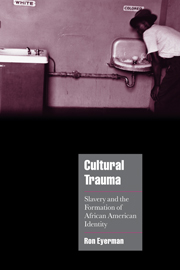Book contents
- Frontmatter
- Contents
- Acknowledgments
- 1 Cultural trauma and collective memory
- 2 Re-membering and forgetting
- 3 Out of Africa: the making of a collective identity
- 4 The Harlem Renaissance and the heritage of slavery
- 5 Memory and representation
- 6 Civil rights and black nationalism: the post-war generation
- Notes
- List of references
- Index
- Cambridge Cultural Social Studies
1 - Cultural trauma and collective memory
Published online by Cambridge University Press: 22 September 2009
- Frontmatter
- Contents
- Acknowledgments
- 1 Cultural trauma and collective memory
- 2 Re-membering and forgetting
- 3 Out of Africa: the making of a collective identity
- 4 The Harlem Renaissance and the heritage of slavery
- 5 Memory and representation
- 6 Civil rights and black nationalism: the post-war generation
- Notes
- List of references
- Index
- Cambridge Cultural Social Studies
Summary
What has been lost is the continuity of the past … What you then are left with is still the past, but a fragmented past, which has lost its certainty of evaluation.
Hannah ArendtIt is memory that counts, that controls the rich mastery of the story, impels it along …
Jorge SemprunIntroduction
In this book the formation of an African American identity will be explored through the theory of cultural trauma (Alexander et al. 2001). The “trauma” in question is slavery, not as institution or even experience, but as collective memory, a form of remembrance that grounded the identity-formation of a people. There is a difference between trauma as it affects individuals and as a cultural process. As cultural process, trauma is mediated through various forms of representation and linked to the reformation of collective identity and the reworking of collective memory. The notion of a unique African American identity emerged in the post-Civil War period, after slavery had been abolished. The trauma of forced servitude and of nearly complete subordination to the will and whims of another was thus not necessarily something directly experienced by many of the subjects of this study, but came to be central to their attempts to forge a collective identity out of its remembrance.
- Type
- Chapter
- Information
- Cultural TraumaSlavery and the Formation of African American Identity, pp. 1 - 22Publisher: Cambridge University PressPrint publication year: 2001
- 1
- Cited by



